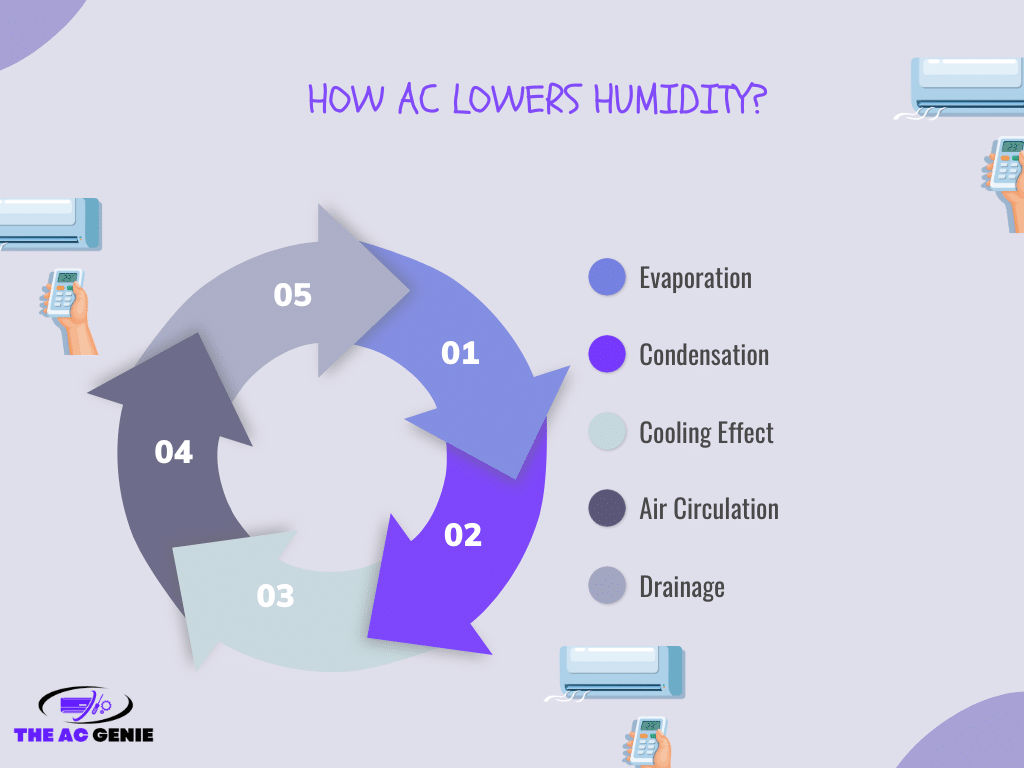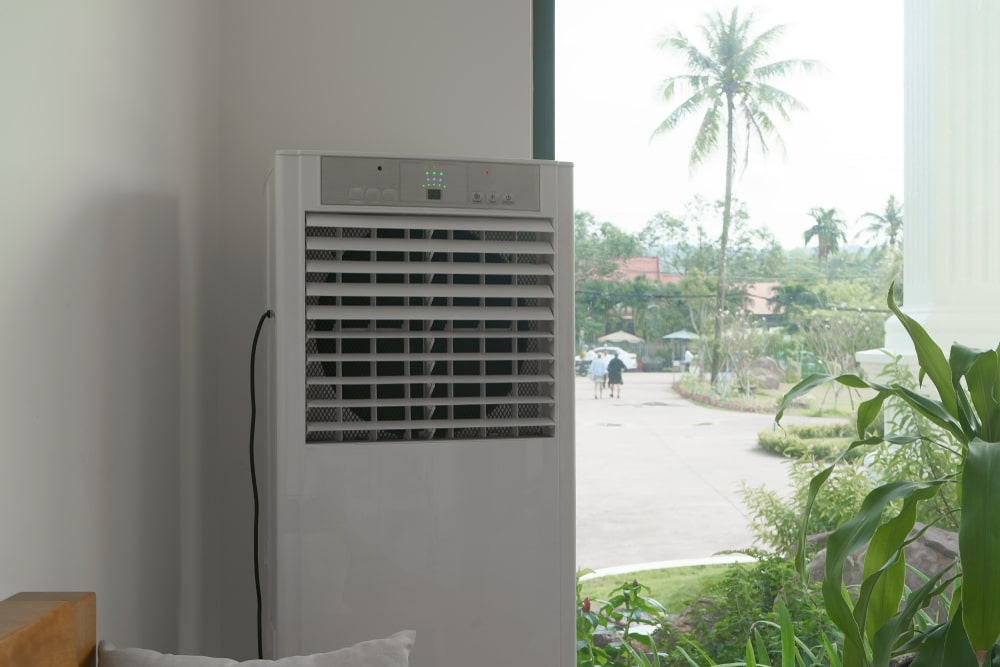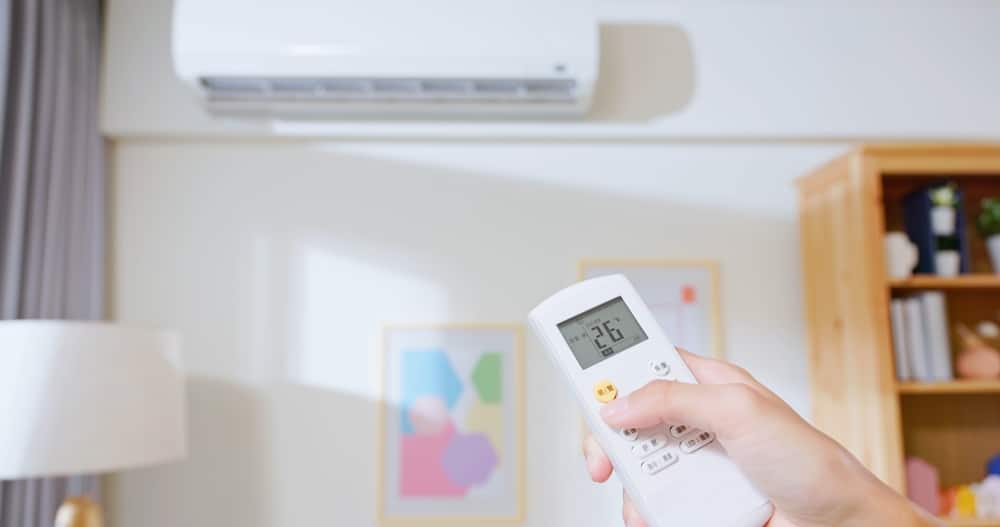Table of Contents
Ah, summers are here, and there’s going to be a hell of humidity all over, but what perfect solution do we have other than our cooling machine, AKA the air conditioner? Our AC is the only electric appliance that saves us from the heat of warm summers. But Wait, have you ever gotten behind the mystery of how an AC lower humidity? An air conditioning machine does help lower the humidity inside a space. Now, in addition to reducing the temperature inside your home, air conditioners may regulate the relative humidity, which is critical for human health and comfort. A more comfortable atmosphere, fewer allergies, and less mold can be achieved thanks to air conditioners that remove excess moisture. Let us now understand air conditioning and humidity in detail.
Understanding Humidity and Air Conditioning
Do you know how humidity actually takes birth inside a closed space? The term “humidity” describes the relative humidity of two air samples. In addition to being uncomfortable, high humidity levels can cause a host of issues within your home, such as mold growth and harm to furnishings and structural components. Not only does an air conditioner reduce room temperature, but it also aids in humidity control by evaporating surplus moisture just like heating. The steps involved in this procedure are shown here. Now, let’s take a look at how air conditioners help to lower humidity.

How Air Conditioners Reduce Humidity?
Cooling and condensation are the two main mechanisms by which air conditioners reduce relative humidity within a space;
- Evaporator Coil Function: Inside the air conditioner, the evaporator coil draws heat from the surrounding air. Cool air is produced as hot air moves over this coil. Humidity levels drop as air gets more relaxed, resulting in water droplets.
- Condensation and Drainage: A pan collects condensed moisture, which is then emptied from the system via a drain line. You can lower the relative humidity in your home by following this procedure.
Key Benefits of Lowering Humidity with Air Conditioning
Now, what are the key advantages of lowering humidity in ACs? Let us take a look.
- Improved Indoor Air Quality: Lower humidity levels help in reducing the growth of mold and mildew, which can affect air quality, and cause health issues.
- Enhanced Comfort: High humidity can make the air feel warmer than it actually is. By removing excess moisture, air conditioners help maintain a more comfortable indoor environment.
- Protection for Home and Belongings: Reducing humidity prevents damage to furniture, walls, and other materials that can be caused by excessive moisture.

Air Conditioning vs. Dehumidifiers
While air conditioners do help reduce humidity, they are not the same as dehumidifiers. Dehumidifiers are specifically designed to remove moisture from the air, and they can be used in conjunction with an air conditioning system for better results in areas with extremely high humidity. Here’s a brief comparison;
Air Conditioner
Primarily cools the air and removes some humidity as a secondary effect.
Dehumidifier
Focuses on removing moisture from the air and is often used in conjunction with an AC system for optimal humidity control.

Tips for Managing Humidity with Air Conditioning
To maximize the effectiveness of your AC system in controlling indoor humidity, consider the following tips;
- Regular Maintenance: Ensure that you’re A/C system and aircon filters are regularly cleaned and maintained. This helps in keeping the HVAC system efficient and effective in controlling humidity. Also makes sure the pressure on both sides is maintained in an AC.
- Use Exhaust Fans: In areas prone to high humidity, such as kitchens and bathrooms, use exhaust fans to help remove excess moisture.
- Monitor Humidity Levels: Use a humidity gauge to keep track of indoor moisture levels. Ideally, indoor humidity should be kept between 30-50% for optimal comfort and health.
- Consider a House Dehumidifier: In addition, if you live in a region with very high humidity, supplementing your AC with a house dehumidifier can help maintain a comfortable and healthy indoor environment.

Final Thoughts
Summing up, lowering indoor humidity is a great way to improve air quality and make your house more comfortable. Air conditioners work by eliminating excess moisture from the air. Issues like mold growth and poor indoor air quality can be mitigated with their ability to chill the air and facilitate condensation. Use a dehumidifier, exhaust fan, and clean air filter to get the most out of your air conditioner’s humidity management. Hence, if you’re thinking, “Does air conditioning increase or decrease humidity?” or “Does AC lower humidity?” the answer is yes.
In conclusion, humidity is something that air conditioning helps manage, making the air we breathe healthier and more comfortable.
Here’s to a relaxed, cool home space!
